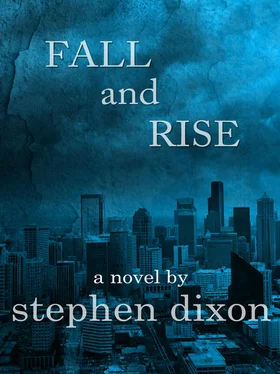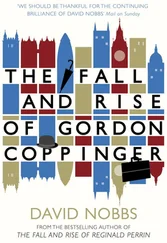Stephen Dixon - Fall and Rise
Здесь есть возможность читать онлайн «Stephen Dixon - Fall and Rise» весь текст электронной книги совершенно бесплатно (целиком полную версию без сокращений). В некоторых случаях можно слушать аудио, скачать через торрент в формате fb2 и присутствует краткое содержание. Год выпуска: 2013, Издательство: Dzanc Books, Жанр: Современная проза, на английском языке. Описание произведения, (предисловие) а так же отзывы посетителей доступны на портале библиотеки ЛибКат.
- Название:Fall and Rise
- Автор:
- Издательство:Dzanc Books
- Жанр:
- Год:2013
- ISBN:нет данных
- Рейтинг книги:5 / 5. Голосов: 1
-
Избранное:Добавить в избранное
- Отзывы:
-
Ваша оценка:
- 100
- 1
- 2
- 3
- 4
- 5
Fall and Rise: краткое содержание, описание и аннотация
Предлагаем к чтению аннотацию, описание, краткое содержание или предисловие (зависит от того, что написал сам автор книги «Fall and Rise»). Если вы не нашли необходимую информацию о книге — напишите в комментариях, мы постараемся отыскать её.
Fall and Rise — читать онлайн бесплатно полную книгу (весь текст) целиком
Ниже представлен текст книги, разбитый по страницам. Система сохранения места последней прочитанной страницы, позволяет с удобством читать онлайн бесплатно книгу «Fall and Rise», без необходимости каждый раз заново искать на чём Вы остановились. Поставьте закладку, и сможете в любой момент перейти на страницу, на которой закончили чтение.
Интервал:
Закладка:
“That was smart, taking two with you when you sat,” woman sitting down on the couch says.
“This? It was someone else’s and I didn’t want to waste it.”
“Someone you know I hope.”
“No, but I trust him. I figured — one of Diana’s friends? How contagious could he be?”
“What if, and this is just a what-if, it happened to be a friend of her friend’s — someone he just picked up at a bar? I don’t mean that, since I’m sure everyone here is more than all right, but only as an example to be more cautious other times?” and drinks from a mug of beer.
“Oh, beer. That’s what I should’ve got. I didn’t see any.”
“In the refridge. Mugs in the cabinet above. Like some of mine?”
“Sure you’d want to drink from it after I took a swig?”
“You’re an actual friend of Diana’s, aren’t you? Or at least not someone she picked up at a seedy bar minutes before she put this whole thing together, and naturally I don’t mean it, and you look clean.”
“Very clean. And hand-invited, that’s me. But shower a day. Obsessively clean. Believe me, I change my teeth at the very minimum once a week.”
“Maybe we ought to drop the subject.”
“Right. Sometimes I never know where my mouth’s going to go.”
“That doesn’t have to be a bad thing. And if you want some beer you’ll get your own then, not that I’m worried I’ll catch anything from you.”
“No, tainted wine suits me fine and the alcohol in it kills the — but I should stop that. Honestly, thanks for the offer.” I turn to the party, figuring she no longer wants to talk and not being that interested in the conversation either.
“Who are you,” she says, “besides Diana’s friend if you are?”
“I am. From summer camp.”
“From hundreds of years ago when you were both counselors or campers there?”
“I’m sorry, I shouldn’t have assumed everyone knew that reference. An artist colony upstate.”
“That place. With the signed Tiffany windows and where she went this summer. You must be a painter. You look like one.”
“Nope, a translator. And before you ask — you were going to?”
“I’ll have to now.”
“For the present a not, in English, very well known contemporary Japanese poet. Name’s Jun Hasenai.”
“Never heard of him. But I’m not familiar with most poetry. My husband’s the one.”
“That so? What’s he do?”
“Forget about him. I always talk about him when I sit on couches at parties. I want to know about your work. Your poet’s very good?”
“Believe me. But most translators, when they choose what they’re going to translate out of love or whatever you want to call it—”
“Certainly not money.”
“Money? Money? What’s that? Some new form of currency? No, that’s not funny. Anyway, they think all the previous translations of it aren’t good enough, though with Hasenai I’ve been lucky since there’s almost been nothing in English and not one book.”
“I’m excited, a terrific new writer I’ve never heard of. Can you quote some of it?”
“In English or Japanese?”
“You speak Japanese too?”
“Now who’s kidding whom?”
“I’m not. I thought it might be one of those transliteral or what do you translators call those translations — where you translate from the less meticulous and poetic translations of the originals?”
“That’s close enough. Now don’t call me a chauvinist, at least the malevolent kind, for I could give you a list of my kindred and unconsanguineous sisters who’ll swear I’m not, but I bet you picked that up from your husband who I bet is a lit professor who I bet has writ tomes of published poems.”
“He is and has.”
“Well, that’s a good profession. No, I do the entire thing. I even write the poems for Hasenai in the original and let him take all the credit.” I take off my glasses. “I have to take these off and put them in their holder and the holder into my pocket or someplace safe so I know they won’t fly off my face and break or holder flop out of my pocket and get stepped on, when I recite one of Hasenai’s peppier poems. ‘Night is a moon and then it’s cigarette-yellow and done. Christ, I can’t go on. The evening’s reached its peak and the coyote is gone.’”
“That’s good. And the whole poem I wager. And who would have thought they have coyotes in Japan, or is that your word for a similar animal there that has no exact counterpart in English? Of course the poem’s probably better in the original.”
“I just now made it up.”
“Translated it?”
“No, it’s my own.”
“That’s mean. You fooled me.”
“Or maybe I’m a good spontaneous poet, how about that?”
“You’re not being very nice.”
“Why? Suppose I now said it was Hasenai’s and I worked days on it and had only said it was mine to momentarily fool you? I don’t usually do that and wouldn’t know why I would, but I’m capable of it.”
“No, you’re smart enough to know what your motives are. As for the poem, I’m no hypocrite. To my uncultivated ears — hubby’s poems or not, and I plead guilt to not reading them all and those I do I mostly don’t understand, a problem no one else seems to have — what you recited seemed quite good.”
“Thanks. And I was being too playful — maybe prematurely playful — with you. You already admitted you didn’t know or care much for poetry, so where’d I come off trying to fool you? And it was my poem alone. I don’t know if it was whole. I’ve even forgotten what I spontaneously wrote, but since I didn’t put it on paper or memorize it — you don’t remember it, do you?”
“Except for a coyote in it, no.”
“Anyway, I can’t say it was written. And probably everything I’d spontaneously compose is influenced by modern Japanese writing and these days especially, Hasenai’s, so you’re right if you also thought it sounded somewhat Japanese.”
“Since it had no Japanese references in it, it didn’t particularly sound like anything to me.”
“Okay. Just don’t if you don’t mind tell Diana about this or she’ll never invite me back and then we’ll never meet again.”
“I’ve a big mouth too sometimes so I can’t guarantee what will happen.” She gets up. “Excuse me. I’m not going to the powder room or to take a breath of fresh exercise or anything. Enjoy yourself.”
“Please. No apologies necessary. Just mine.” She leaves. I get up for more cheese. I also don’t want to be sitting here when she starts talking to someone about me. “That man there. On the couch, to the left. I don’t want to turn around but he — there’s nobody there? I’m referring to his left. He’s sort of disinterestedly dressed, hair gushing out of his chest, a varicose nose? There he is. Well him. Talk about a man being mixed up?”
Jane and Phil are talking to each other at the cheese table. Now there are hard sausages on it, creamed herrings, sliced vegetables, an egg and chicken salad mold with a dollop of caviar on top, pâtés and dips. I dip a zucchini stick into a dip, bite it while I slice off some pâté, put the pâté on a cracker, add a piece of cheese to it, put the rest of the zucchini into my mouth, cheese falls to the table, while I reach for it the pâté drops to the floor. I pick the cheese up and put it into my mouth, pick up the pâté with a paper napkin, can’t find a used plate or ashtray to put the napkin in so I put it into my back pants pocket, but I might sit on it by the time I get rid of it so I put it into my side pocket, eat the cracker and look at Jane and Phil. They’ve been watching me, resume talking. “I’m not so sure,” Jane says. “You’re not so sure? Good God, if Shakespeare could mix metaphors and get away with it—”
Читать дальшеИнтервал:
Закладка:
Похожие книги на «Fall and Rise»
Представляем Вашему вниманию похожие книги на «Fall and Rise» списком для выбора. Мы отобрали схожую по названию и смыслу литературу в надежде предоставить читателям больше вариантов отыскать новые, интересные, ещё непрочитанные произведения.
Обсуждение, отзывы о книге «Fall and Rise» и просто собственные мнения читателей. Оставьте ваши комментарии, напишите, что Вы думаете о произведении, его смысле или главных героях. Укажите что конкретно понравилось, а что нет, и почему Вы так считаете.












